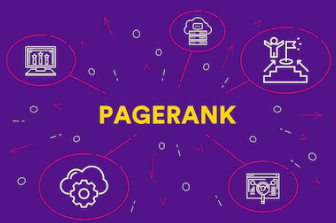1. White text on white background
One of the most common mistakes for beginners is the idea of placing white text on a white background.
The idea is to put as much text and as many search terms as possible on one page. However, the real visitor should not see them.
Many years ago, this method actually worked. But not for long.
This is simply wrong for several reasons. Google can now recognize if the text color and the background color are the same.
This makes the Googlebot suspicious and in the worst case it also devalues the whole website. So you lose hard-fought rankings.
So: absolutely avoid it!
2. Outgoing links improve the ranking
Technically and broken down to the link itself, an outbound link will bring you nothing.
But there’s still a lot of discussion about this myth. Often there are only links to your own internal pages. After all, you don’t want to refer visitors to other sources and thus lose them.
On the other side is the following argument and interesting consideration: If I link another web page, then my opposite gets that too.
Of course this sends a very positive signal and you draw attention to your own website.
If you perhaps email the other website operator about it, there is a very good chance of consideration. So they can share your content via their social media channels, link to you in another article or see it as the beginning of a long-term cooperation.
3. The more often the keyword appears, the better
Yep, this method actually worked once. Even if not very long.
That’s how you could do keyword stuffing in the past.
There the text, the meta description, the meta keywords and some other things were filled with a certain keyword as often as possible.
However, the texts have become unreadable for humans!
If you wanted to be found for e.g. “law firm”, you have simply put 100 times “law firm” as a word in your text. In the short term this worked well and brought you rankings.
But not for long.
Of course Google reacted quickly to this and measures interesting terms: How often does the term appear in relation to the rest of the text?
The company does not reveal exact figures about what the “right” ratio is. Google always points to a “natural relationship”.
Of course, the focus on a keyword makes sense. Only you should not exaggerate.
4. A high PageRank is important
 Google evaluates websites with the help of a PageRanks.
Google evaluates websites with the help of a PageRanks.
This was invented by Larry Page (hence the name) and is based on this Stanford work.
There is an internal and an external PageRank. The internal is somewhat more complex than the external. The external, on the other hand, is public and works with a simple scale of 1-10.
If you look at the doctoral thesis, then the basis was and is that the more links to your website point, the higher your PageRank is.
In the past, PageRank and links from websites with a high PageRank were very relevant.
However, the PageRank is only of minor importance today.
A justified criticism of the PageRank is that it shows the interest of other website operators … and not the interest of other users.
In addition, the public PageRank has been discontinued since 2014. This means that it is no longer updated.
However, the internal PageRank remains alive.
5. Buying keyword domains and forwarding them helps.
We very often discover this confused construct in many companies: Thousands of keyword domains have been purchased and redirected to a target website.
I can promise you that it won’t do you any good!
The Googlebot is intelligent. He understands it when a domain simply forwards and has no content of its own.
So it makes no sense to buy the domain “blogbetreuung.at” and forward it to “ithelps.at” to be found with “blogbetreuung”.
In addition to that I have to say that a keyword in a domain has advantages in search engine optimization.
Even though keyword domains have generally lost importance, this MOZ study shows that they still rank a bit better.
The question is, for how long?
